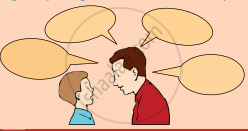Advertisements
Advertisements
प्रश्न
Explain the following line with reference to the context.
‘I’m killed, Sire!’ And, his Chief beside, Smiling, the boy fell dead.
उत्तर
- Reference:
These lines are taken from Poem – “Incident of the French Camp”, Poet – “Robert Browning”. - Context:
The poet appreciated the heroic behavior of the young soldier. - Explanation:
Napoleon became very happy about his victory, But suddenly he realized that the soldier was seriously wounded. He asked the soldier if he was wounded. The soldier replied that he was almost killed. Saying this he fell beside the emperor and died smilingly.
APPEARS IN
संबंधित प्रश्न
Who is the narrator in the poem?
Did the soldiers fight with the enemies face to face?
Our captain was brave and we were true
Underline the alliterated word in the following line.
With our arms and provender, load on load.
Read the line given below and answer the question that follow.
A creeper climbs, in whose embraces bound No other tree could live.
- Which tree is referred to in the above lines?
- How does the tree survive the tight hold of the creeper?
- Why does Toru Dutt use the expression ‘a creeper climbs’?
Read the line given below and answer the question that follow.
The giant wears the scarf, and flowers are hung
In crimson clusters all the bough among!
- Who is the giant here?
- Why is the scarf colourful?
Identify the figure of speech used in each of the extract given below and write down the answer in the space given below.
“ LIKE a huge Python, winding round and round
The rugged trunk indented deep with scars”,
Describe the reminiscences of the poet, when she sees the casuarina tree.
When does a man become a judge? How?
Pick out the word in ‘alliteration’ in the following line.
“And one man in his time plays many parts”
Describe the various stages of a man’s life picturised in the poem “All the World’s a stage."
Shakespeare has skilfully brought out the parallels between the life of man and actors on stage. Elaborate this statement with reference to the poem.
Pick out the lines which convey that his quest for travel is unending.
Read the set of line from the poem and answer the question that follow.
… I mete and dole
Unequal laws unto a savage race,
That hoard, and sleep, and feed, and
know not me.
- What does Ulysses do?
- Did he enjoy what he was doing? Give reasons.
Read the set of line from the poem and answer the question that follow.
Little remains: but every hour is saved
From that eternal silence, something more,
A bringer of new things; and vile it were
- How is every hour important to Ulysses?
- What does the term ‘Little remains’ convey?
Explain with reference to the context the following line.
I am become a name; For always roaming with a hungry heart
Explain with reference to the context the following line.
We are not now that strength which in old days Moved earth and heaven;
Explain with reference to the context the following line.
To strive, to seek, to find, and not to yield.
Every parent is anxious about the welfare of his/her children. Parents express their anxiety by advising them almost all the time. What kind of advice do you frequently receive from your parents? Fill in the bubbles. Tick the ones you like to follow implicitly and give reasons for the ones you don’t like to follow.

How would the poet’s advice help his son who is at the threshold of the manhood?
Why does the poet advise his son to have lazy days?
Explain the following line with reference to the context.
and guide him among sudden betrayals
and tighten him for slack moments.
Explain the following line with reference to the context.
Yet learning something out of every folly
hoping to repeat none of the cheap follies
Where was Napoleon standing on the day of attack on the city of Ratisbon?
What does the phrase ‘full galloping’ suggest?
What did the rider do when he reached Napoleon?
Where did the rider plant the French flag after Ratisbon was captured?
Literary Devices
Mark the rhyme scheme of the poem. The rhyme scheme for the first stanza is as follows.
| With neck out-thrust, you fancy how, | a |
| Legs wide, arms locked behind, | b |
| As if to balance the prone brow | a |
| Oppressive with its mind. | b |
